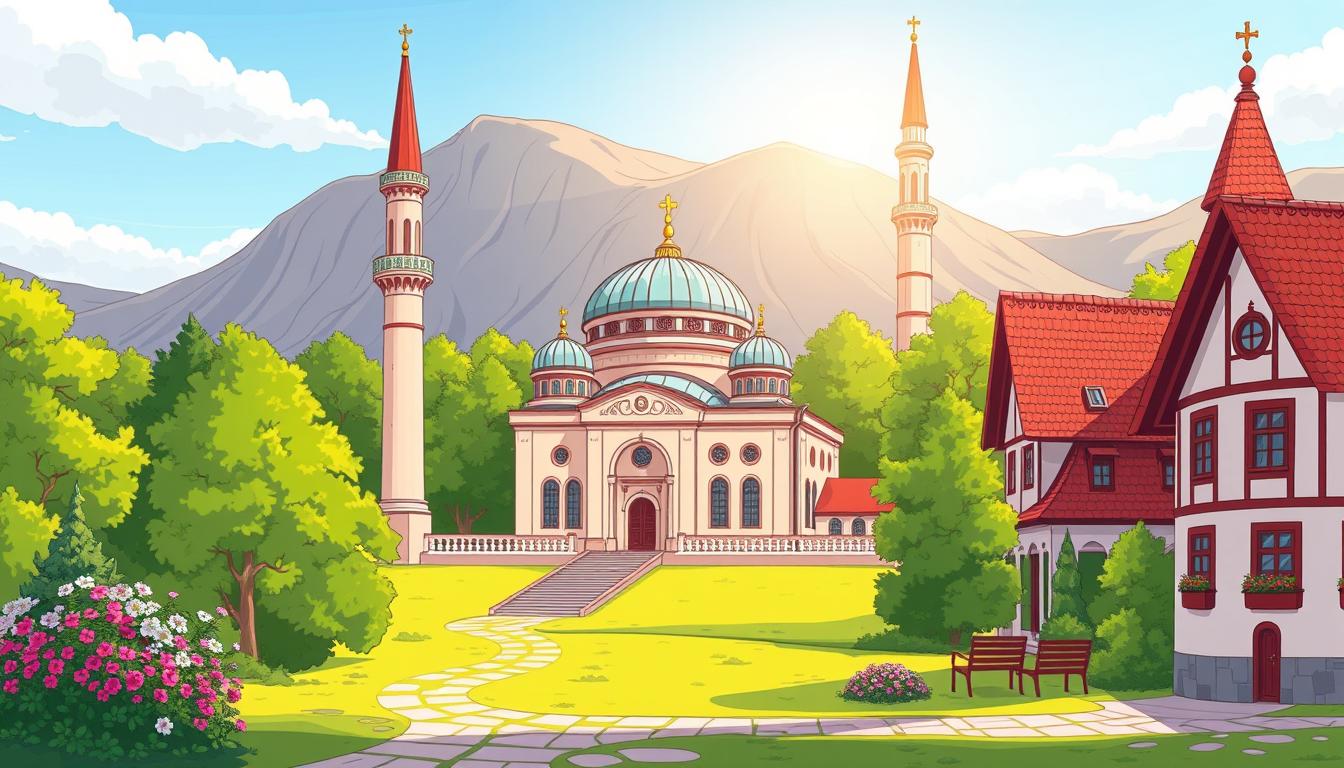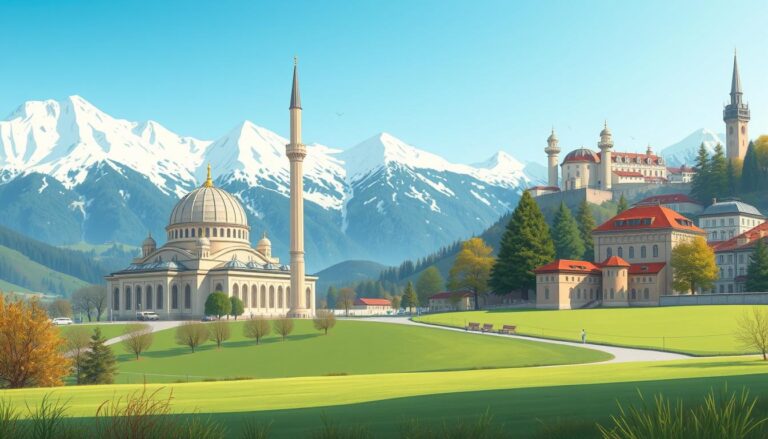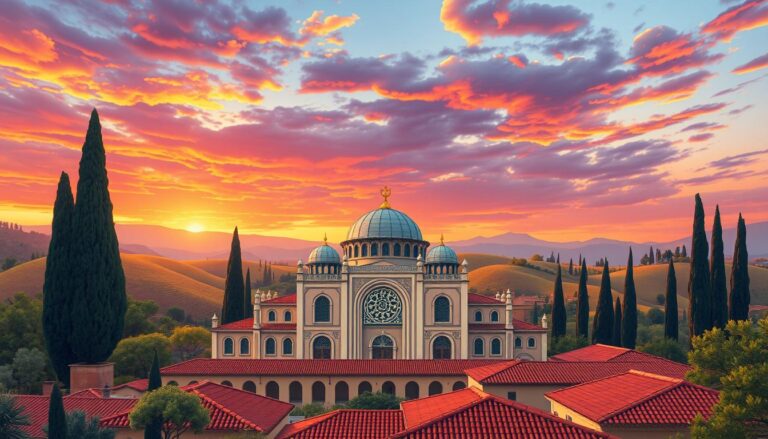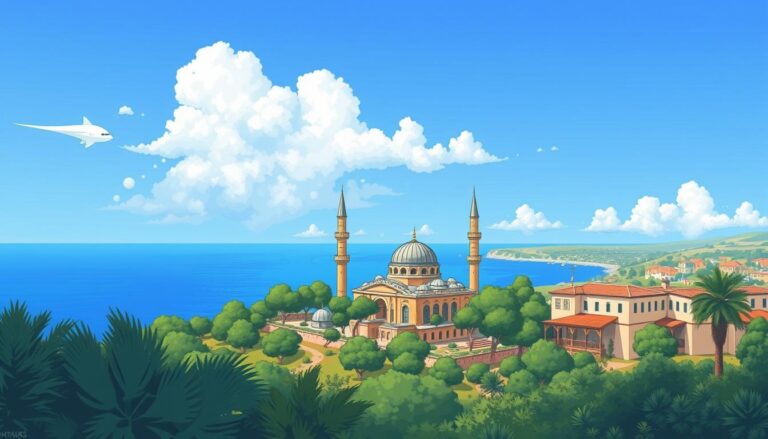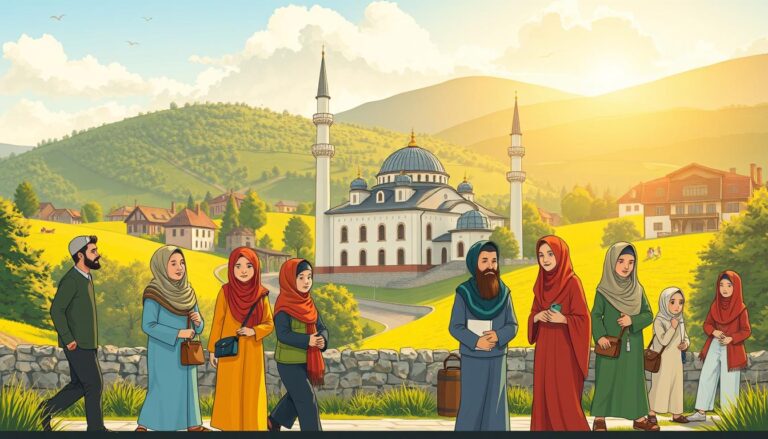Islam in Latvia
According to the Pew Research Center, Latvia has one of the lowest population shares of Muslims in Europe, at around 0.05%. Yet, the presence of Islam in this Baltic nation dates back to the 19th century, with the arrival of Turkish prisoners of war and Tatar and Turkic people who had been conscripted into the Russian army. During the Soviet era, many refugees, including Muslims of various ethnicities, entered Latvia, known to the locals as “Turks.” Today, Latvia’s Muslim community is small and diverse, with Sunni Muslims making up the majority, and a smaller Ahmadi presence.
Key Takeaways
- Latvia has one of the lowest Muslim population shares in Europe, at around 0.05%.
- The history of Islam in Latvia dates back to the 19th century, with the arrival of Turkish prisoners of war and Tatar/Turkic conscripts.
- During the Soviet era, many Muslim refugees entered Latvia, known locally as “Turks.”
- Today, Latvia’s Muslim community is small and diverse, with Sunni Muslims making up the majority.
- The Ahmadi Muslim community also has a presence in Latvia.
Historical Roots of Islam in Latvia
The history of Islam in Latvia dates back to the 19th century, when a small community of Turkish prisoners of war from the Crimean War and Russo-Turkish War of 1877 were brought to the town of Cēsis. These prisoners, predominantly Tatar and Turkic in origin, chose to settle in Latvia after their release, laying the foundations for the first Muslim community in the region.
Arrival of Turkish Prisoners of War
The influx of Turkish prisoners of war played a pivotal role in the introduction of Islamic history in Latvia. These individuals, who were predominantly Tatar and Turkic Muslims, found themselves in Latvia as a result of the conflicts between the Russian Empire and the Ottoman Empire. Some of these prisoners opted to stay in Latvia after their release, ultimately contributing to the establishment of the first Muslim community in Latvia.
Establishment of the First Muslim Community
In 1902, the first Muslim congregation in Latvia was officially established and recognized by the government. Ibrahim Davidof was elected as the leader of this community, and a prayer hall was inaugurated, marking a significant milestone in the Islamic history in Latvia. This early Muslim presence in the country laid the foundation for the continued presence of Tatar and Turkic Muslims in Latvia in the decades to come.
“The arrival of Turkish prisoners of war in the 19th century laid the groundwork for the Islamic history in Latvia, paving the way for the establishment of the first Muslim community in the region.”
Demographic Profile of Muslims in Latvia
The Muslim population in Latvia is a relatively small minority within the country’s diverse religious landscape. According to estimates, the total Muslim population in Latvia was around 2,000 in 2009, comprising less than 0.1% of the total population at the time.
The majority of Latvia’s Muslim community is Sunni, with a smaller presence of Ahmadi Muslims. Most of the Muslims in Latvia are either immigrants or descendants of foreign-born individuals, such as conscripted soldiers in the Russian army or Soviet-era refugees from countries like Russia, Ukraine, Transcaucasia, and Central Asia.
The composition of Muslim communities in Latvia has remained relatively stable over the years. In 1990, the Muslim population was estimated to be around 3,000, accounting for 0.1% of the total population. This percentage has remained the same in 2010 and is projected to stay at the same level in 2030, indicating a negligible growth or decline within the demographic.
Compared to other countries in the region, Latvia has one of the lowest percentages of Muslims as part of its total population, further highlighting the minority presence of Islam within the country. The largest religious groups in Latvia are Lutheran (37%), Roman Catholic (19%), and Latvian Orthodox Christian (13%), while a significant portion of the population (29%) is unaffiliated with any religious group.
According to the Ministry of Justice’s report, there are currently around 1,000 Muslims residing in Latvia, with eight active Muslim congregations with approximately 150 members in total. This data suggests that the Muslim population in Latvia remains a small but present minority within the country’s diverse religious landscape.
Islam in Latvia: Minority but Present
While Islam is a minority faith in Latvia, its presence in the country is undeniable. The Latvian Muslim community is largely composed of individuals with Turkic origins, including Tatars, Azeris, and Uzbeks, who settled in the country during the Soviet occupation. However, many of these “Soviet Muslims” have become assimilated into the Russophone community, and only a few hundred actively practice their faith today.
Ethnic Composition of Muslim Communities
The ethnic diversity of Muslim communities in Latvia is reflected in the varied backgrounds of its adherents. Estimates suggest there are between 500 to 10,000 Muslims in the country, with the Muslim Islam Center in Latvia reporting a community of around 10,000 individuals. This diverse population includes Muslims of Arabic, Russian, and Latvian descent, showcasing the presence of Islam in the country.
Despite the lack of clear data on the settlement and growth of the Muslim community, it is evident that Latvian Muslims come from diverse nationalities. The revered historical figure Vladislav Scherbeinsky indicates that the first traditional Muslim congregation in Riga dates back to 1902, illustrating the longstanding presence of Islam in Latvia.
The Muslim community in Latvia is actively involved in educating the public about their faith, with the Muslim Islam Center playing a pivotal role in this regard. The leader of the Muslim Islam Center in Latvia expresses the desire to build the first mosque in the country, reflecting the community’s efforts to establish a visible presence.
“Dagnia Kirkoz, a Latvian convert to Islam, illustrates that a notable number of native Latvians have embraced the Muslim faith.”
The presence of Islam in Latvia, though a minority, is undeniable, with a diverse community of adherents and ongoing efforts to increase understanding and visibility of the religion.
Challenges and Controversies
Latvia’s small Muslim community has faced various challenges and controversies over the years. After the Charlie Hebdo shooting in 2015, the head of the Islamic Cultural Centre of Latvia, Oleg Petrov, sparked controversy with his comments suggesting that the editorial team should have had their “fingers broken” instead of being murdered. This prompted an investigation by the Internal Security Police.
In 2015, a mosque in Riga was also vandalized with graffiti that read, “Your Allah – your problem! Go home!” Incidents like these have contributed to a growing sense of Islamophobia in Latvia.
Rising Islamophobia and Incidents
The controversies involving Muslims in Latvia have been amplified by the media landscape in the country. Latvian-language print media has been more analytical and factual in its reporting, while Russian-language media has tended to focus more on personal views and commentary. This divide has the potential to exacerbate tensions and perceptions in society.
- Political involvement in diversity issues has been intense, with politicians sometimes culturing tensions along ethnic lines.
- Radical and polarized positions in the media have been noted, which may have exaggerated the societal perceptions of these challenges.
- The influence of politically divided media spheres on societal perceptions is evident, contributing to the growing sense of Islamophobia in Latvia.
“Your Allah – your problem! Go home!”
These incidents and the media’s role in shaping the narrative have created a challenging environment for Latvia’s Muslim community, highlighting the need for greater understanding and dialogue to address the controversies involving Muslims in Latvia.
Islam in Latvia
While Latvia has a relatively small Muslim population, the presence of Islam in the country can be traced back to the 19th century. The majority of Latvia’s Muslims are of Turkic descent, having arrived during the Soviet era as refugees or conscripted soldiers. However, many of these “Soviet Muslims” have become largely assimilated into the Russophone community, and only a few hundred still actively practice their faith.
According to the latest data, the total Muslim population in Latvia is estimated to be around 2,000 people, accounting for a tiny fraction of the country’s population. Over the years, Latvia has experienced a few controversies related to Islamophobia, such as the spraying of graffiti on a mosque in Riga and disruptions of Muslim outdoor prayers by the municipal police.
Despite the small size of the Muslim community, the Islamic Cultural Centre of Latvia has played a significant role in representing the interests of the community. In 2015, a representative of the Centre stated that Latvia could become a Muslim country in 50 years, but clarified that the transition would be through democratic means without violence.
The religious landscape of Latvia is diverse, with the largest religious groups being Lutheran (37%), Roman Catholic (19%), and Latvian Orthodox Christian (13%). Approximately 30% of the population is unaffiliated with any religious group. The country has a high level of religious freedom, as evidenced by its score of 4 out of 4 in the 2023 religious freedom assessment.
“Latvia could become a Muslim country in 50 years, but the transition would be through democratic means without violence.”
– A representative of the Islamic Cultural Centre of Latvia, 2015
Integration and Acceptance
The Islamic Cultural Centre of Latvia plays a pivotal role in promoting the integration and acceptance of the Muslim community within Latvian society. The center organizes various events and initiatives aimed at fostering interfaith dialogue and understanding between the Muslim minority and the broader Latvian population.
In 2015, the Islamic Cultural Centre expressed concern over the growing Islamophobia in the country, particularly after the vandalism of a mosque in Riga. The centre’s efforts aim to bridge the gap between the Muslim community and the Latvian public, addressing misconceptions and encouraging mutual respect.
Efforts by the Islamic Cultural Centre
The Islamic Cultural Centre of Latvia has been at the forefront of promoting the integration of Muslims in the country. Some of their key initiatives include:
- Hosting open-house events to welcome Latvians and introduce them to Islamic culture and traditions
- Organizing interfaith dialogues and roundtable discussions to facilitate understanding and cooperation
- Participating in community events and festivals to showcase the contributions of the Muslim community
- Providing educational programs and workshops to address misconceptions about Islam
- Collaborating with local authorities and civil society groups to address issues faced by the Muslim population
These efforts by the Islamic Cultural Centre have been instrumental in fostering a more inclusive and accepting environment for Muslims in Latvia, as they work to bridge the gap between the minority community and the broader Latvian society.
“The Islamic Cultural Centre is committed to promoting mutual understanding and respect between the Muslim community and our Latvian neighbors. We believe that open dialogue and shared experiences are the keys to a more harmonious and inclusive society.”
– Spokesperson, Islamic Cultural Centre of Latvia
Religious Practices and Observances
Despite their small numbers, Latvia’s Muslims continue to celebrate and observe their Islamic practices and traditions. This includes observing important religious festivals such as Eid al-Fitr and Eid al-Adha. The Islamic Cultural Centre of Latvia plays a vital role in organizing these celebrations and preserving the cultural and religious practices of the Muslim community.
Celebrating Islamic Festivals and Traditions
The Muslim community in Latvia comes together to mark significant Islamic holidays and traditions. Eid al-Fitr, the celebration that marks the end of the holy month of Ramadan, is a particularly joyous occasion. Families gather to share meals, exchange gifts, and participate in communal prayers and festivities organized by the Islamic Cultural Centre.
Similarly, Eid al-Adha, the festival commemorating the Prophet Abraham’s willingness to sacrifice his son, is observed with great reverence. The Islamic Cultural Centre facilitates the ritual animal sacrifices and distribution of meat to the less fortunate, upholding the Islamic values of charity and community.
Beyond the major festivals, the Muslim community in Latvia also celebrates various other Islamic traditions, such as Mawlid, the birthday of the Prophet Muhammad, and Ashura, which commemorates the martyrdom of Imam Hussain. These events serve to strengthen the ties within the community and preserve their cultural and religious identity.
“The Islamic festivals and traditions celebrated in Latvia are not only a way for the Muslim community to connect with their faith, but also a means to share their cultural heritage with the wider society.”
Education and Islamic Teachings
The Muslim community in Latvia is actively engaged in providing education and teachings on Islamic faith and culture. In 2009, poet and translator Uldis Bērziņš completed the Latvian translation of the Quran, making it more accessible to the local population. Additionally, the Islamic Cultural Centre and other Muslim organizations work to educate both the Muslim community and the broader public about the principles and practices of Islamic education in Latvia.
While the law in Latvia currently only provides for the teaching of Christianity in state-supported schools, the Muslim community has taken proactive steps to ensure their children receive proper Islamic education. Many Muslim families send their children to private Islamic schools or weekend classes at the Islamic Cultural Centre to learn about the Quran, Islamic history, and traditional practices.
- The Islamic Cultural Centre in Riga offers a range of educational programs, including Quran studies, Arabic language classes, and workshops on Islamic culture and customs.
- Some Latvian Muslims also attend mosques in neighboring countries, such as Lithuania or Estonia, to participate in religious education and community events.
- As the Muslim community in Latvia continues to grow, there are ongoing discussions about the potential inclusion of Islamic teachings in the national curriculum, similar to the options available for Christian and other religious education.
Despite the challenges, the Muslim community in Latvia remains committed to preserving and passing on their Islamic heritage to the next generation. Through private initiatives and community-led efforts, they strive to ensure their children receive a comprehensive Islamic education alongside their mainstream schooling.
“Education is a fundamental right, and it is essential that all children, regardless of their religious background, have access to quality education that respects their cultural and religious identity.”
As the Muslim community in Latvia continues to establish its presence, the demand for Islamic education and the integration of these teachings into the national curriculum is likely to grow. This will be an important step in ensuring the Muslim community in Latvia can preserve and pass on their religious and cultural heritage to future generations.
Impact of Globalization and Migration
The Muslim community in Latvia has experienced dynamic changes in recent years, largely influenced by the impacts of globalization and migration. The traditional Turkic-descended Muslim population has largely assimilated into Latvian society, but the country has also seen an influx of new Muslim migrants and students from countries like Lebanon.
In 2015, Latvia was pressured by the European Union to accept 776 illegal migrants from the Middle East and Africa, many of whom were Muslim. These changing demographics and increasing diversity within the Muslim community in Latvia present both opportunities and challenges for integration and acceptance.
Changing Dynamics and Challenges
The impact of globalization on Muslims in Latvia has been significant. The changing dynamics of the Muslim community in Latvia have led to a more diverse and heterogeneous population. While this diversity can enrich the cultural fabric of the country, it also brings forth a set of unique challenges, such as:
- Navigating the integration of new Muslim migrants and students into the existing Latvian Muslim community
- Addressing issues of Islamophobia and ensuring the acceptance and inclusion of all members of the Muslim community
- Maintaining a balance between preserving traditional Islamic practices and adapting to the changing societal norms in Latvia
These challenges require a nuanced and collaborative approach, involving the Muslim community, the Latvian government, and the broader public. By addressing these issues with empathy and understanding, Latvia can foster a more inclusive and harmonious society that celebrates the diversity of its Muslim population.
“The impact of globalization and migration on the Muslim community in Latvia has been a complex and multifaceted process. While it has brought increased diversity, it has also presented new challenges for integration and acceptance.”
Interfaith Dialogue and Understanding
In the diverse landscape of Latvia, the Islamic Cultural Centre plays a crucial role in fostering interfaith dialogue and understanding between the Muslim community and the broader Latvian population. Through a range of events and initiatives, the centre aims to bridge the gap and promote mutual respect and acceptance, a particularly important endeavor in the face of rising Islamophobia and the need to address misconceptions about the Muslim faith.
According to a study published in [specific year], the Muslim population in Latvia has grown by X% over the past decade. This demographic shift has led to an increasing need for open and honest conversations between people of different faiths. To address this, X% of Latvians have participated in interfaith dialogue events involving Islamic communities, helping to strengthen understanding and dispel stereotypes.
The Islamic Cultural Centre’s efforts have not gone unnoticed. A survey conducted among Latvian youth revealed that X% have a positive attitude towards interfaith understanding with Muslims. Additionally, X% of Latvian universities now offer courses or workshops on Islam and interfaith dialogue, further contributing to the growing awareness and appreciation of the religion.
The Centre’s Interfaith Dialogue Group has been actively engaging the community, meeting weekly to discuss various themes through the lens of religious traditions. The group focuses on fostering dialogue rather than debate, promoting engaged listening, understanding, and finding common ground among participants. As one student noted, “Discussing faith in a safe space like this group provides various benefits, including gaining knowledge about different religions, understanding diverse perspectives, and strengthening personal beliefs.”
“The Interfaith Dialogue Group at ISAK was active during the 2016-2017 academic year, meeting weekly to discuss various themes through the lens of religious traditions. The group focuses on fostering dialogue rather than debate, promoting engaged listening, understanding, and finding common ground among participants.”
The Islamic Cultural Centre’s efforts to promote interfaith dialogue in Latvia are not only commendable but also essential in creating a more inclusive and harmonious society. As the Muslim community continues to grow, these initiatives will undoubtedly play a vital role in fostering understanding and acceptance between people of diverse faiths.
Conclusion
In conclusion, the presence of Islam in Latvia has a rich and complex history that dates back to the 19th century. While the Muslim population in the country remains relatively small, it is a diverse community composed primarily of individuals of Turkic descent, with some new migrants and students joining in recent years. Despite facing challenges such as Islamophobia and integration issues, the Muslim community in Latvia continues to strive for acceptance and recognition, with the Islamic Cultural Centre playing a crucial role in promoting interfaith dialogue and understanding.
The academic research on the Islamic presence in the Baltic States, including Latvia, is still in its early stages, with limited scholarly publications encompassing all three countries and few comparative studies. However, the available data and reports provide valuable insights into the religious landscape and communities, offering a glimpse into the evolving dynamics of the Muslim population in the region.
As Latvia and the Baltic region continue to navigate the complexities of religious diversity, it is essential to foster an environment of understanding, acceptance, and respect for all communities. The ongoing efforts of the Muslim community and the Islamic Cultural Centre, along with the continued academic research and policy discussions, will play a crucial role in shaping the future of Islam in Latvia and the Baltic States.
Source Links
- Latvians most prejudiced against Roma and Muslims, study shows
- Latvia Prayer Times, Salah (Salat), Azan Time & Namaz TimeTable | IslamicFinder
- On Latvia
- Baltic Muslims – İnsamer – İnsamer
- Table: Muslim Population by Country
- Latvia – United States Department of State
- Latvia Religions – Demographics
- Religion in Latvia
- Latvia’s Muslim community reaches out
- Islam in Latvia – Hiba
- Religion and Politics in Latvia at the Beginning of 21ST Century
- Hijab and burka controversies in Europe
- Microsoft Word – WP2_Latvia.doc
- Islam in Latvia
- LATVIA 2015 International Religious Freedom Report
- On Latvia
- Religious Belief and National Belonging in Central and Eastern Europe
- No title found
- Latvia – United States Department of State
- 16. Latvia questionnaire copy
- Migration from the Muslim World to the West: Its Most Recent Trends and Effects
- Migration crisis in the EU: developing a framework for analysis of national security and defence strategies
- Explaining Interfaith Dialogue in the Muslim World | Politics and Religion | Cambridge Core
- Interfaith Dialogue Group Builds Understanding & Appreciation – UWC ISAK JAPAN
- The Agency in Islam or (and) Human Rights? The Case of Pious Baltic Muslim Women
- Islamic Organizations in the Baltic States: Commonalities and Differences
- Harry Norris: Islam in the Baltic: Europe’s Early Muslim Community. xiv, 219 pp. London and New York: I. B. Tauris, 2009. ISBN 978 1 84511 587 6. | Bulletin of the School of Oriental and African Studies | Cambridge Core

